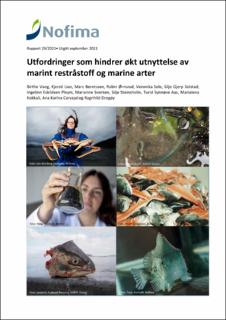| dc.contributor.author | Vang, Birthe | |
| dc.contributor.author | Lian, Kjersti | |
| dc.contributor.author | Berntssen, Marc HG | |
| dc.contributor.author | Ørnsrud, Robin | |
| dc.contributor.author | Sele, Veronika | |
| dc.contributor.author | Solstad, Runar Gjerp | |
| dc.contributor.author | Pleym, Ingelinn Eskildsen | |
| dc.contributor.author | Svorken, Marianne | |
| dc.contributor.author | Steinsholm, Silje | |
| dc.contributor.author | Aas, Turid Synnøve | |
| dc.contributor.author | Kokkali, Marialena | |
| dc.contributor.author | Carvajal, Ana Karina | |
| dc.contributor.author | Dragøy, Ragnhild | |
| dc.date.accessioned | 2021-09-29T08:52:44Z | |
| dc.date.available | 2021-09-29T08:52:44Z | |
| dc.date.created | 2021-09-09T13:53:46Z | |
| dc.date.issued | 2021 | |
| dc.identifier.isbn | 978-82-8296-692-4 | |
| dc.identifier.uri | https://hdl.handle.net/11250/2785934 | |
| dc.description.abstract | Regjeringen har i flere meldinger uttalt at det skal legges til rette for økt verdiskaping i sjømatnæringen. Et bidrag inn mot dette er utvikling innen sirkulær bioøkonomi og innføring av en mer bærekraftig produksjon og økt utnyttelse av råstoff. Det er en økonomisk, etisk og miljømessig gevinst i å utnytte de marine ressursene i havet bedre, og det skal settes som mål at mest mulig av råstoffet skal følge "mat først"-prinsippet, og deretter brukes til høyest mulig verdi, f.eks. til fôr – både produksjons- og kjæledyrfôr. Denne rapporten er utarbeidet av Nofima i samarbeid med Havforskningsinstituttet, Norges sjømatråd og SINTEF Ocean, med innspill fra næringsaktører, etter oppdrag fra Nærings- og fiskeridepartementet (NFD). Oppgaven fra NFD var å identifisere hvilke hinder næringsaktørene opplever knyttet til utnyttelse av restråstoff, biprodukter og nye arter som kan redusere verdiskapingen i sjømatnæringen. Rapporten gir en oversikt over gjeldende regelverk for bruk av nye arter, restråstoff og biprodukter til humant konsum, fôr etc., markeds- og regulatoriske hindre som kan begrense næringsutviklingen, eksempler på sertifiserings- og merkeordninger, samt grenseverdier for fremmedstoffer i fôr, fôrprodukter og matprodukter. | |
| dc.description.abstract | The Norwegian Government has stated that strategic efforts will be made for increased value creation in the seafood industry. A contribution towards this is developments in the circular bioeconomy and the introduction of a more sustainable production and increased utilization of raw materials. This report has been prepared by Nofima in collaboration with the Institute of Marine Research, the Norwegian Seafood council and SINTEF Ocean, with input from business actors, in response to an assignment from the Ministry of Trade, Industry and fishery (NFD). The task from NFD was to identify the obstacles that the industry experience related to the utilization of residual raw materials, by-products and new species that can reduce value creation in the seafood industry. The report provides an overview of current regulations for the use of residual raw materials and by-products for human consumption, feed, market, and regulatory barriers that may limit business development, examples of certification and labeling schemes, limit values for contaminants in feed, food- and feed products. | |
| dc.language.iso | mis | |
| dc.publisher | Nofima AS | |
| dc.relation.ispartof | Nofima rapportserie | |
| dc.relation.ispartofseries | Nofima rapportserie | |
| dc.title | Utfordringer som hindrer økt utnyttelse av marine restråstoff og marine arter | |
| dc.title.alternative | Challenges that prevent an increased utilization of marine residual raw materials and marine species in Norway | |
| dc.type | Research report | |
| dc.description.version | publishedVersion | |
| dc.source.pagenumber | 53 | |
| dc.source.issue | 29/2021 | |
| dc.identifier.cristin | 1932854 | |
| dc.relation.project | Nofima AS: 10866 | |
| cristin.ispublished | true | |
| cristin.fulltext | original | |
